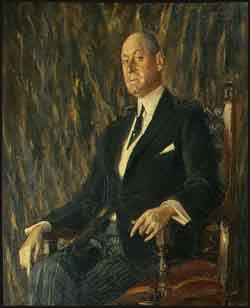 Joseph Early Widener
(1871-1943)
Joseph Early Widener
(1871-1943) Joseph Early Widener
(1871-1943)
Joseph Early Widener
(1871-1943)
By Richard Sanders, Editor, Press for Conversion!
Widener is known to have donated at least $20,000 to the American Liberty League.
The Wideners were close to being an American royal family. Joseph’s vast inheritance made him one of the country’s richest men and allowed him to spend his life engaged in the passions of racing and breeding thoroughbred horses, collecting priceless works of art, donating to fascist causes and hobnobbing with others in his elite class.
Joseph’s great wealth came from his father, Peter Arrell Brown Widener (1834-1915), a Philadelphia butcher who, thanks to the Civil War, and his Republican Party connections, got a $50,000 government contract to supply meat to all Union soldiers within 10 miles of town. In 1873, he served as Philadelphia’s Republican treasurer. Two years later, he started buying railways, like the Pennsylvania Railroad (the country’s biggest) and streetcar companies in Philadelphia, Pittsburgh, Baltimore and Chicago. He was a Director of both the Reading Railroad and the Baltimore & Ohio Railroad. Gustavus Myers, in History of the Great American Fortunes, says that to secure his grip on the rails, Widener bribed the Philadelphia city council and the Pennsylvania Legislature. PAB, an organizer of U.S. Steel and the American Tobacco Co., was also, along with J.P. Morgan, a top shareholder in the International Mercantile Marine, owner of the White Star Line. When it’s flagship, the Titanic, sank in 1912, Joseph’s brother George and nephew Harry both died.
In 1915, Joseph became the 20th richest man in America when he inherited $60 million (the equivalent of about $657 million in 2002). He attended Harvard and Philadelphia Universities but was not terribly interested in being a businessman. Waited upon by 100 servants, Widener lived at Lynnewood Hall, a grand, 110-room, Georgian-style palace on a carefully manicured 300-acre estate near Philadelphia. (During WWII, the grounds were turned over for the training of U.S. military dogs.) Joseph and Queen Mary exchanged catalogues of their art collections in 1932. Widener’s collection included works by Renoir, Manet and Rembrandt and he entertained Spanish, Russian and Swedish royals who came to see his precious art collection. In 1939, much of this collection was donated to the National Gallery of Art and Philadelphia’s Art Museum. In 1930, Widener spent $2.5 million on another home, in Palm Beach Florida. (This 40,000-square-foot, Italianate mansion is now owned by the pioneer of Netscape.)
During the 1920s, Widener had been mostly breeding and selling horses. Among his buyers were Averill Harriman and George Herbert Walker who, in those years, through their company, Brown Brothers Harriman, were busy with George W. Bush’s grandfather, Prescott, in the task of financing Hitler’s rise to power. But Widener was so preoccupied with collecting horses and art that he didn’t seem to dirty his hands much with politics. In 1934, as president of the Hialeah racetrack, he did stop a strike by trainers who were wrongfully blamed for drugging their horses with caffeine.
Widener was, however, donating princely sums to finance fascist political groups like the American Liberty League in the 1930s and a Texas-based organization, called Christian America, in the 1940s. This second group had been organized by Vance Muse in 1936, and was backed largely by the Kirby family of Texas. Two years earlier, Kirby and Muse, an associate of Gerald L.K. Smith, also organized the Southern Committee to Uphold the Constitution, an American Liberty League front organization. Thanks to Widener and his ilk, the “Christian Americans” were well-funded. Its group members saw Hitler as a “new messiah” on a mission to save Germany from “political confusion,” “bedlam and chaos” caused by “Jewish ownership.” They criticized Roosevelt and his “pink cabineteers,” for “blatantly and violently broadcast[ing] silly insults” against Hitler. Seeing unions as dangerous hotbeds for Reds and other subversives and radicals, Muse led Christian America’s political campaign for anti-labour right-to-work laws in sixteen states during the early 1940s. He couldn’t have done it without backers like Alfred Sloan, the du Ponts and Wall Street lawyer Ogden Mills (Andrew Mellon’s Treasury secretary who took over that post when Mellon resigned in scandal.) and, of course, Joseph Widener.
Some Sources:
P.A.B. (Peter Arrell Brown) Widener
http://www.netrax.net/~rarebook/s960605b.htm
David King, The Titanic Disaster and the Widener Family
http://www2.widener.edu/Wolfgram-Memorial-Library/Archives/titanic.htm
"America's Richest: The First Rich List," Forbes
Magazine, Sept. 27, 2002.
http://www.forbes.com/2002/09/27/0927richest_print.html
The Origins of the Trainer Responsibility Rule
http://www2.als.edu/glc/wagering/trainerresprule.pdf
David Whitmire, The Wideners: An American Family, 2003.
http://www.encyclopedia-titanica.org/articles/wideners.pdf
Danielle Reed, "Broadway Producer Finds a 'Must-Have'
Property," Wall Street Journal, Jan. 23, 2004.
http://homes.wsj.com/columnists/private/20040123-private.html
"Muse, Vance," The Handbook of Texas Online
http://www.tsha.utexas.edu/handbook/online/articles/view/MM/fmu22.html
Hudson Valley home to nation's visionaries, Poughkeepsie Journal,
2004
http://cityguide.pojonews.com/fe/Heritage/stories/he_hudson_valley_visionaries.asp
Source: Press for Conversion! magazine, Issue # 53, "Facing the Corporate Roots of American Fascism," March 2004. Published by the Coalition to Oppose the Arms Trade.
Order a Copy: Order a hard copy of this 54-page issue of Press for Conversion! on the fascist plot to overthrow President F.D.Roosevelt and the corporate leaders who planned and financed this failed coup.